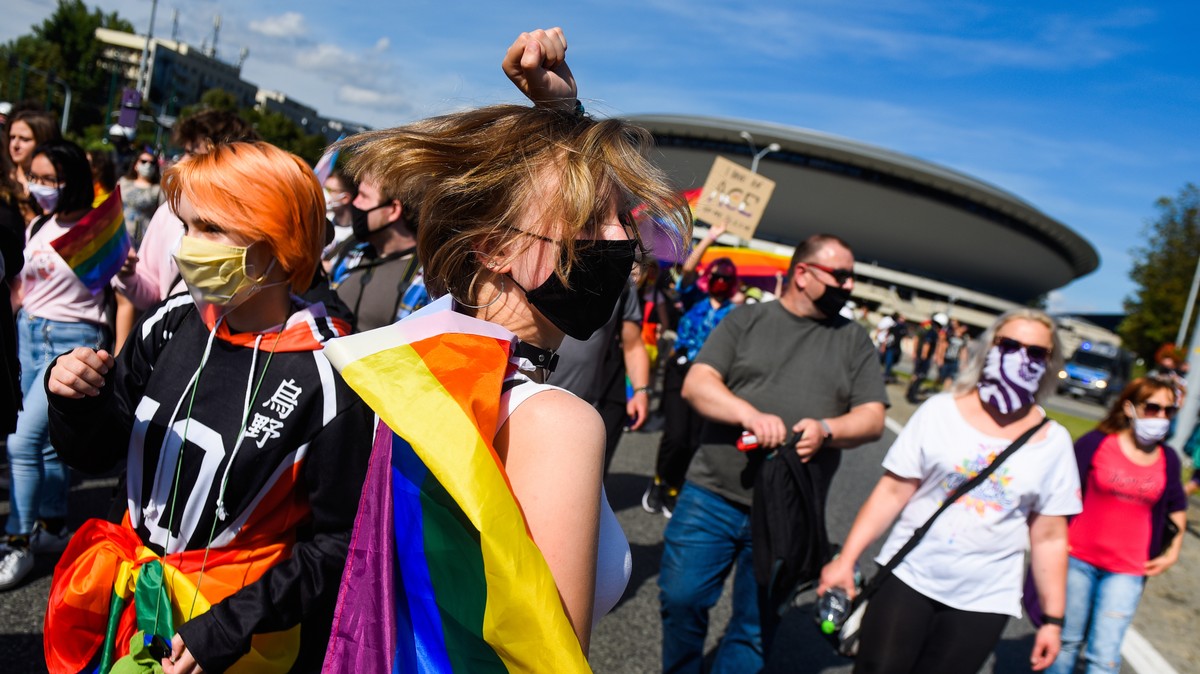
If young people today aren’t growing up on TikTok, chances are they’ve already grown up on Tumblr.
International friends were formed over fandoms, personal sexualities were discovered, and social justice dominated the microblogging platform. The latter has led to the site often receiving criticism for being full of "social justice warriors" and alternatively, "not safe for work" content—before nudity was banned from the site in December 2018. But for many young people, it was the first online environment where they could truly be themselves.
Advertisement
Years later, I find myself endlessly scrolling TikTok, an app becoming known for 16-year-olds making money by dancing in their bedrooms. But underneath this, the platform is hosting the same LGBTQ+ discourses which plagued Tumblr, recycled and absorbed in 60-second video clips by Gen-Z.
These patterns seemingly emerged during the height of the pandemic, driven by a TikTok trend involving lip syncing to a section of "Big Picture" from the musical Ordinary Days.
The meme normally goes like this: A character sings an elaborate coffee order, overlaid with text showing a long list of identities or preferences they had for themself at a younger age. They then turn to someone else, who says they will have “just tea,” with a second overlay displaying their current, often singular, identity.
This dislike of “microlabels”—a collection of lesser-known identities that fall under an umbrella term—has origins within Tumblr discourse. Conversations about non-binary identities and the concept of "split attraction," which some people on the asexual spectrum use to explain how they experience romantic and sexual desire differently, are now being repackaged with video and annoying backing tracks.
Each video would disparage the use of microlabels, without thought or debate around people using such labels to make themselves more comfortable. Neo-pronouns used by some non-binary people, such as xe/xem/xeir, have faced a similar fate, with people calling them harmful or arguing that they aren’t valid.
Advertisement
“[People] want to see that discourse happen,” Disabled Eliza, a queer, non-binary TikToker who produces educational content on the platform, told Motherboard. “People who have the intention of being mean [probably] need support”.
With its 60-second limit for videos and restrictions on comment length, TikTok doesn't allow for much in terms of nuance. Two months ago, creators intentionally leaned into this with "No Nuance November"—a trend of stating opinions with no further context.
TikTok itself soon caught on. “It's #NoNuanceNovember, so post your hot takes with no context and run,” reads the app’s own description of the viral hashtag.
This is, however, a theme on the platform overall, with young people absorbing knowledge from bitesize videos as if they are fact, before scrolling on without another thought.
While Tumblr allowed more room for discussion and links to sources, there were still consistent issues of ignoring facts, and gatekeeping remained prominent. Often dismissed as a sexuality birthed on the site, discussions on asexuality—experiencing little to no sexual attraction—have made their way onto the younger platform. Identical arguments of years past, like that asexual people do not experience oppression or are simply straight, are being raised once more, repackaged for a younger generation.
Advertisement
Why does this duplicated discourse occur? “Social media platforms have long been the place where subcultures and marginalized people have flourished, where those who feel isolated in their offline context can meet like minded people," Zoe Glatt, a PhD Researcher at London School of Economics in Media and Communications, told Motherboard.
“It used to be that LGBTQ+ communities existed in small pockets of the Internet, on Tumblr and YouTube,” she continued, “but in recent years, shifting attitudes towards gender and sexuality have meant that LGBTQ+ concerns and discourses have become much more part of the mainstream.”
Six years on from when I first experienced these online arguments, the repetition may well come from newer generations growing up and experiencing the internet, in a society which is theoretically more liberal and accepting.
“TikTok has primarily been a place for younger generations to congregate and interact, much like Tumblr was for an older generation, and so it generated lots of conversations that ordinarily wouldn't be seen on other platforms," Chris Stokel-Walker, author of upcoming book TikTok Boom, told Motherboard.“ [Marginalized communities have] said that it's good to see themselves represented there, and to be able to take part in the discourses online.”
TikTok is perhaps the first exploration of gender and sexual identity for some who have been brought up in conservative households. Or it could come down to the remaining lack of education of these communities in schools.
The cycle doesn’t appear to be breaking.
“The discourses that circulate on social media have a profound impact on communities in the offline world,” Glatt added, “not because media determines social life, but because media is a part of social life.”
With TikTok constantly regurgitating discourse from its older sister, the repetition poses a problem from which its community needs to distance. If we can’t accept each other in our own larger online community, there is no doubt that those outside of it are more likely to see this and oppose us, too.
"discourse" - Google News
January 27, 2021 at 09:00PM
https://ift.tt/36iYtOt
TikTok’s LGBTQ+ Discourse is Just a Re-Run of Tumblr - VICE
"discourse" - Google News
https://ift.tt/2KZL2bm
https://ift.tt/2z7DUH4
No comments:
Post a Comment